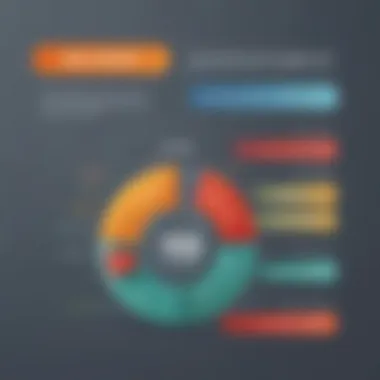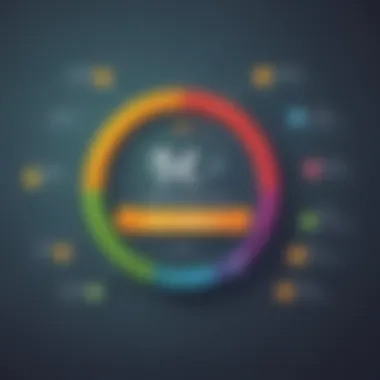Homeowner Loans for Bad Credit: Options Explained


Intro
Navigating the realm of homeowner loans can often feel like wandering through a maze, especially when bad credit enters the picture. The reality is that many people find themselves in tight financial spots due to various reasons—job loss, medical expenses, or other unexpected financial burdens. When the credit score isn’t looking too hot, it creates an uphill battle when trying to secure financing for a home.
Understanding what bad credit truly means is crucial. It doesn’t just refer to a number; it speaks volumes about one’s financial history and spending behavior. Typically, credit scores below 580 are labeled as bad credit, signaling potential lenders to think twice before extending a loan. But all isn’t lost, as the world of loans is diverse.
From traditional avenues, such as banks, to alternative solutions like peer-to-peer lending, there is generally a ray of hope for homeowners with challenging credit situations. With every option, however, comes its own set of implications and risk factors that borrowers need to consider carefully.
When discussing loans, the terms tossed around can be confusing. Making sense of jargon like “APR,” “secured vs. unsecured loans,” and “collateral” is vital for everyday homeowners looking to make the best decision. It’s not just about finding a loan; it’s about finding the right one for one’s unique situation.
Delving into this article, readers can expect an exploration of available loan options, insight into the broader landscape of credit ratings, and tangible steps they can take toward improving their financial standing. Don't let a less-than-stellar credit score keep you up at night; knowledge is power, and arming yourself with the right information is the first step toward reclaiming financial stability.
Understanding Bad Credit
Understanding bad credit is crucial for anyone looking to obtain homeowner loans, especially when dealing with financial constraints. Bad credit isn't just a term thrown around casually; it has tangible effects on one’s ability to secure financing, often leading to higher interest rates or even outright denials. By grasping what constitutes bad credit, the reader can better navigate their options and find suitable financial solutions.
Definition of Bad Credit
Bad credit typically refers to a poor credit history, which lenders assess through credit scores. A credit score of 580 or lower often falls into the category of bad credit. This score serves as a numerical representation of how responsibly an individual has managed their debts in the past. Think of it as a report card; consistently late payments, defaults, or bankruptcy can lead to a poor grade, making future borrowing much more complicated.
Common Causes of Bad Credit
Several factors can contribute to a bad credit score. Here are some noteworthy causes:
- Late Payments: The payment history makes up a large part of credit scores; missing even one payment can have a sizable impact.
- High Credit Utilization: Using too much of your available credit can signal to lenders that you’re living beyond your means.
- Collections Accounts: If you owe money that’s been handed over to collections, this will drag your score down significantly.
- Bankruptcy: Undoubtedly, declaring bankruptcy is a severe event—its remnants can linger on your credit report for up to ten years.
- Hard Inquiries: Each time you apply for a loan, a lender checks your credit, and too many inquiries can negatively affect your score.
Impact of Bad Credit on Financing Options
When it comes to financing your home, having bad credit complicates matters substantially. Those with lower scores are often limited to fewer options with possibly higher costs. Lenders might offer subprime loans, which generally carry higher interest rates, given the perceived risk of default. This means that not only do those with bad credit pay more for their loans, they might also face restrictive terms, which can include:
- Higher Down Payments: Lenders may require a larger initial payment to offset the perceived risk.
- Additional Fees: Loan origination fees and other costs can pile up, further straining budgets.
- Limited Choices: Borrowers may find themselves stuck with only a couple of loan options, restricting their ability to negotiate terms.
The intersection of bad credit and financing options is a challenging terrain; understanding these dynamics equips borrowers with crucial insights for improvement and action.
Navigating homeowner loans with a bad credit score is no walk in the park, but the first step lies in comprehending the nature of credit dynamics. Recognition of one’s credit standing, along with the causes and consequences associated with it, provides a foundation for making informed decisions in the financial landscape.
The Role of Credit Scores
Navigating the maze of homeowner loans becomes significantly easier when one understands the pivotal part credit scores play in the process. Lenders look at credit scores as a reflection of how trustworthy a borrower is. Essentially, a credit score is a three-digit number that lenders use to gauge the likelihood that a borrower will repay their debts. Having a good grasp of credit scores helps individuals with bad credit explore their loan options better and equips them with tools to enhance their financial status.
Understanding Credit Scores
A credit score is calculated based on various elements of one's credit history. Payment history accounts for a large chunk of this score; if someone consistently misses payments, it will negatively impact the score. Another key factor is the amount of debt a person carries. If debts are high relative to the credit limit, it can signal to lenders that the borrower may be overextended.
Furthermore, the length of time one has maintained credit is also essential. This is often referred to as the credit history. Older accounts can positively influence the score, showing lenders a track record of responsible credit management.
In simpler terms, think of your credit score as the report card of your financial behavior. Just like in school, consistently poor performance can result in being overlooked for preferred loan options.
Credit Score Ranges and What They Mean
Credit scores typically fall into ranges that signify different levels of creditworthiness:
- 300 to 579: Poor
- 580 to 669: Fair
- 670 to 739: Good
- 740 to 799: Very Good
- 800 and above: Excellent
Understanding these ranges is crucial for homeowners with bad credit. A score below 580 can be a red flag for most lenders, pushing individuals to explore alternative financing options. Buyers with a fair credit score in the 580 to 669 range may qualify for specific loans, but at a higher interest rate than those with better scores. Such nuances can dictate the financial journey of a borrower, affecting monthly payments and long-term affordability.
How Lenders Evaluate Credit Scores
Lenders evaluate credit scores through their own unique metrics and scales, and they often use specific thresholds for borrowing. While major credit bureaus provide essential credit scores, lenders sometimes take a deeper look into the details behind those numbers. They may analyze:
- Debt-to-Income Ratio: This is the percentage of income that goes towards debt payments. A high ratio may signal financial stress.
- Credit Utilization: This explains how much credit a borrower is using compared to their total credit limit. Keeping this figure below 30% is often ideal.
- Recent Inquiries: Applying for new credit can temporarily lower a score, which can make lenders cautious.
Ultimately, factors like past delinquencies, bankruptcy filings, and the mix of credit types can all have an impact. A lender’s assessment allows them to determine if offering a loan is risky based on the borrower's entire financial history, not just the credit score itself.
"Lenders look at more than just the number; they want a full picture of financial responsibility."
For those grappling with bad credit, understanding the role credit scores can essentially turn the tide when applying for homeowner loans. By being well-informed, borrowers can strategize ways to improve their credit status, which is often the first step towards getting the financing they desperately seek.
Types of Homeowner Loans Available
Understanding the options for homeowner loans is crucial for anyone grappling with bad credit. These loans can pave the way for individuals seeking to acquire or refinance a home, despite the shadows cast by poor credit history. The focus here is to demystify the different types of loans available, outlining both traditional avenues and alternative financing options. Knowing these options can empower borrowers to make informed decisions and ultimately improve their financial situation.
Traditional Loans
FHA Loans
FHA loans, backed by the Federal Housing Administration, serve a pivotal role in assisting those with bad credit. One of the standout features of FHA loans is their lower credit score requirement, often accommodating scores as low as 580. This characteristic makes it a go-to for many aspiring homeowners facing credit challenges. Moreover, these loans typically allow for a down payment as low as 3.5%, which is advantageous for buyers who may not have a hefty savings pool.
The unique aspect of FHA loans lies in their insurance premiums. Borrowers must pay an upfront premium along with monthly insurance, which can raise overall financing costs. However, the trade-off is significant when you consider the accessibility these loans provide. Notably, borrowers often find that despite the added costs, the ability to purchase a home outweighs potential drawbacks.
VA Loans
VA loans, available for veterans and active-duty military personnel, offer some of the most beneficial terms in the market. A key feature that makes VA loans appealing is that they don't necessitate a down payment, a rare find for any loan type. This can be particularly comforting for those who may already be operating on tight budgets. Additionally, these loans usually come with competitive interest rates, further easing the burden on borrowers.
The unique selling proposition of VA loans is that they come with a guarantee from the federal government. This drastically reduces the need for private mortgage insurance (PMI), which can lead to substantial savings. While eligibility is restricted to military personnel and certain veterans, the advantages are significant enough that it remains a prime choice for those who qualify.


Conventional Loan Options
Conventional loans are another common pathway, yet they can be a double-edged sword for bad credit borrowers. While they may offer competitive rates for borrowers with good credit, those with a poor credit history face a steeper uphill battle. The minimum credit score often starts around 620, pushing many potential applicants out of the running.
However, a major benefit of conventional loans is their potential flexibility in terms of loan amount and down payments. They allow for both fixed and adjustable-rate mortgages, fitting various financial situations. But borrowers must be wary of the added costs associated with lower credit scores, including possible higher interest rates. Consequently, while they may offer a straightforward path to homeownership, the road can be riddled with obstacles for those with bad credit.
Alternative Financing Options
In situations where traditional loans seem implausible, alternative financing options can offer a lifeline to potential homeowners. Understanding these avenues can be paramount for those faced with adverse credit histories.
Hard Money Loans
Hard money loans are short-term loans that tend to have a higher interest rate and are often secured by real estate. One of the specific strengths of hard money loans is their speed and accessibility. Borrowers can often close a deal in a matter of days, which is suitable in competitive markets. However, they are typically expensive compared to traditional loans, making them a more suitable option for those who can refinance quickly or have specific equity to tap into later.
The unique feature of hard money loans is the reliance on the property’s value rather than the borrower’s creditworthiness. This can attract those in need of financing but might lead to challenges in long-term financial planning.
Peer-to-Peer Lending
Peer-to-peer lending has emerged as a modern alternative to traditional financial institutions. This process involves borrowing money directly from individuals through online platforms. One major benefit here is that interest rates can be lower than those offered by banks, depending on the investor’s assessment of risk.
However, since this is relatively new, the variability of terms and conditions can throw borrowers for a loop. If you’re lucky to find a supportive lender, the advantages are clear, but the risk remains of encountering unfavorable terms.
Subprime Lenders
Subprime lenders cater specifically to borrowers with poor credit, often providing more flexible criteria for approvals. A unique aspect of subprime lending is the ability for individuals to secure loans which might otherwise be unavailable. However, this accessibility comes at a cost: subprime loans typically feature higher interest rates and fees.
While subprime lending can seem appealing to those in immediate need, borrowers must exercise caution. Getting wrapped up in high-interest loans can make repayment difficult, leading to further credit deterioration. Thus, it’s essential to weigh the immediate benefits against potential long-term drawbacks.
Understanding these various loan types allows individuals with bad credit to explore avenues previously thought unattainable, putting them one step closer to homeownership.
Pre-Approval vs. Pre-Qualification
When navigating the terrain of homeowner loans, understanding the difference between pre-approval and pre-qualification is vital for anyone, especially those struggling with bad credit. These initial steps can determine the overall trajectory of a home buying journey. They serve not just as gateways to potential loans but as confidence boosters, helping borrowers set realistic expectations and goals.
Understanding Pre-Approval
Pre-approval is a more formal process than pre-qualification. It involves a thorough examination of your credit history, income, debts, and overall financial situation by a lender. You provide documentation such as pay stubs and tax returns, allowing the lender to evaluate your financial health.
One of the critical advantages of pre-approval is that it gives you a precise loan amount you can expect, making it easier to search for homes within your budget. Additionally, a pre-approval letter holds significant weight in negotiations with sellers. It signals to them that you are a serious buyer, not just someone who is browsing. The better your credit situation, the stronger the pre-approval, making it even more beneficial if you address bad credit before obtaining a pre-approval.
Benefits of Pre-Approval
- Strengthens your borrowing position: Sellers often favor buyers who come with a pre-approval letter, believing they are more likely to follow through with a purchase.
- Clarity on financial limits: Knowing how much you can borrow prevents you from falling in love with homes beyond your reach.
- More leverage in negotiations: When making an offer, the seller may feel more inclined to accept if they trust you have funding secured.
Understanding Pre-Qualification
Conversely, pre-qualification is generally a simpler process, mainly involving a verbal assessment of your financial situation. You tell the lender about your income, debts, and assets, and they estimate your potential loan eligibility. It requires minimal documentation, and sometimes none at all.
While pre-qualification can give you a ballpark figure on what you might afford, it lacks the same rigor as pre-approval.
The informal nature of this process can also work against you when attempting to secure a loan. Some sellers view pre-qualification as less credible compared to its counterpart. However, it can be excellent for quickly gauging your price range if you’re just starting the home-buying journey without the commitment of exhaustive paperwork.
Considerations for Pre-Qualification
- Quick and easy: Often, you can get a pre-qualification letter in a short time, perfect for the initial stages of your home search.
- Helpful for budgeting: Though it isn’t “set in stone,” it provides insight into what you may afford as you begin hunting for properties.
- May reveal readiness for pre-approval: If your pre-qualification reflects needs for improvement, it can inform your next steps toward better credit management.
In summary, both pre-approval and pre-qualification offer their unique benefits and considerations, making them indispensable parts of the loan process. For those with bad credit, seeking pre-approval could set a solid foundation for improving financial security while also clarifying the borrowing landscape. Knowing upfront where you stand is essential, helping you make informed decisions as you move forward.
"Understanding where you stand can make all the difference in successfully securing a home loan, especially when navigating through bad credit situations."
In this uncertain market, being proactive about understanding these terms isn’t just advisable; it’s necessary for your financing journey.
Application Process for Bad Credit Loans
Navigating the application process for bad credit loans can feel like wandering through a maze without a map. However, understanding the steps and requirements can make it a smoother journey. For individuals struggling with poor credit, knowing what to expect and how to prepare is crucial. An organized approach not only eases tensions but also gives you the best shot at securing the financing you need.
Gathering Necessary Documentation
When preparing to apply for a loan, especially with bad credit, you’ll want to approach your documentation like a chef prep-ping before a big meal. Here’s what you should have ready:
- Proof of Income: This could be pay stubs, tax returns, or bank statements showing consistent earnings. Lenders like to see that you can repay your debt.
- Identification Information: An acceptable ID, such as a driver’s license or passport. You would be surprised how many forget this.
- Credit History Information: Even if your credit score is low, having a record of your past accounts can help potential lenders understand your financial behavior.
- Debt Information: A list of current debts, including monthly payments and outstanding balances. This gives a clearer picture of your financial obligations.
Gathering these documents can be somewhat tedious, but consider it part of setting the stage for your success. Having everything at your fingertips can make submitting your application feel far less daunting.
Submitting Your Application
Once you have your documents, it’s time to submit that application. In many instances, you can do this online, but don’t hesitate to meet with a lender face-to-face. This allows you to connect on a personal level, and sometimes, it helps to share your story. Here are several points to consider:
- Choose the Right Lender: Given the plethora of lenders available, select one that specializes in bad credit loans. You can often find helpful reviews and discussions on platforms like Reddit or Facebook.
- Be Honest in Your Application: If you hit the application with a dose of sincerity about your financial history, it can work in your favor. Lenders appreciate transparency, and it's better than dodging the tough topics.
- Check Your Credit Report: Ensure there are no errors in your report that could affect your application. If you spot discrepancies, address them before applying.
Submitting an application isn't just about filling out forms; it’s about telling your story. Make sure to articulate your current financial situation clearly while emphasizing your commitment to improving it.
What to Expect During the Approval Process
After you submit your application, anticipation sets in. The approval process can vary greatly depending on the lender and the specifics of your application. Here’s a breakdown of what you might encounter:


- Initial Review: Lenders will first assess your application and documentation for completeness. If something’s missing, they’ll come knocking for it, so be prepared to respond quickly.
- Credit Check: Expect a thorough evaluation of your credit history. Even though bad credit can feel like a scarlet letter, many lenders are willing to look beyond your score and see the larger picture.
- Loan Terms Discussion: If approved, the lender will present you with loan options, including terms, interest rates, and repayment schedules. Pay close attention to these; better to understand what you’re getting into.
"Know that the journey to securing a loan starts with understanding your financial landscape and knowing your worth, despite past missteps."
Understanding these phases of the process can help alleviate stress. Remember, it’s not just about getting a loan; it's about finding the right loan for your unique circumstances.
With careful preparation, honesty, and patience, the application process can transform from an overwhelming hurdle into a stepping stone toward financial recovery.
Improving Your Credit Score
Improving your credit score is not just about numbers; it’s about unlocking opportunities that can drastically change your financial landscape, especially when it comes to securing a homeowner loan with bad credit. A higher credit score can often lead to visibly better loan terms, lower monthly payments, and increased chances of approval. For those trying to navigate the murky waters of bad credit, understanding how to effectively uplift that score is crucial.
Strategies for Credit Repair
When it comes to repairing your credit, a well-thought-out strategy is your best friend. Here are some effective methods:
- Pay Your Bills on Time: This is perhaps the most straightforward yet impactful strategy. Late payments can have a lasting effect on your scores. Setting up reminders or automating payments can help you stay ahead.
- Reduce Debt Balances: High credit utilization can drag down your score. Aim to lower those outstanding balances. Consider making extra payments on your credit cards rather than just the minimum amount.
- Dispute Errors on Your Report: Occasionally, credit reports harbor inaccuracies, like incorrect late payments or wrong balances. Obtain your credit report from all three major reporting agencies—Equifax, Experian, and TransUnion—and check for discrepancies. If you find any, promptly dispute them.
- Limit New Credit Applications: While it's tempting to apply for multiple credit cards or loans, each application can lead to a hard inquiry, which can temporarily lower your score. Be strategic about when and how often you apply for new credit.
- Become an Authorized User: If you have a family member with good credit, ask them to add you as an authorized user on their credit card. Their payment history will reflect positively on your report, potentially giving your score a nice boost.
Monitoring Your Credit Report
Keeping an eye on your credit report is akin to watching your finances’ pulse. Regular monitoring is vital for several reasons:
- Identifying Fraudulent Activity: Early detection of any unauthorized usage of your accounts can prevent long-term damage. Monitoring your credit regularly enables you to catch such issues before they spiral out of control.
- Understanding Your Credit Profile: By tracking how your score changes over time, you can identify what actions have a positive or negative impact. This clarity allows you to tailor your credit habits accordingly.
- Eligibility for Better Products: Some lenders may periodically check your score. If you monitor and actively improve your score, you might find yourself in a position to apply for better loan products down the line.
Utilizing a variety of tools available, such as free tracking services or credit monitoring apps, can make this task manageable. Services like Credit Karma or Experian provide regular updates, helping you stay on top of your credit situation without breaking the bank.
"Monitoring your credit report isn't just a good habit; it’s a security measure that shields your financial future."
Risks of Borrowing with Bad Credit
Borrowing money when you have bad credit isn’t like taking a stroll in the park; it's more akin to navigating through a tricky maze. The pitfalls can be substantial and, in some cases, rather unforgiving. Here, we will take a closer look at those risks—understanding them is crucial to make informed financial decisions.
Higher Interest Rates
First on the chopping block are higher interest rates. Many lenders perceive individuals with bad credit as high-risk borrowers. This perception can lead to sky-high interest rates, often leaving borrowers clutching their wallets in disbelief. The consequences? Consider this scenario:
- You secure a loan of $150,000 at a 3% interest rate, totaling roughly $244,000 paid over time.
- Now, imagine that same loan at a staggering 8% due to your credit status. You’d end up shelling out almost $350,000.
This dramatic difference underscores the financial strain you might endure if you aren’t cautious. Thus, careful comparison between lenders and interest rates is paramount to ensure you don’t end up in hot water.
Possibility of Foreclosure
Next up is the not-so-lovely specter of foreclosure. Defaulting on a loan inevitably puts your home at risk. It's a chilling thought, but reality for some. When you’re already grappling with bad credit, it may take only a few missed payments on your mortgage for the lender to pull the trigger on foreclosure proceedings.
Imagine investing years into your home only to have it slip through your fingers because of circumstances like job loss or unexpected medical bills. Protecting yourself from this fate often involves having a solid financial cushion—an aspect too easily overlooked by those already challenged by credit issues.
Scams and Predatory Lending
Lastly, the murky waters of scams and predatory lending emerge as a harsh reality. When faced with the urgency of securing a loan, desperate consumers can fall prey to unscrupulous lenders. These establishments may promise low rates or quick approvals but often come with hidden fees and terms that can entrap you in a cycle of debt. Here are a few warning signs to keep in mind:
- Lack of Transparency: If lenders are vague about the terms and fees, steer clear.
- Too Good to Be True Offers: If it sounds like a steal, it likely is.
- Pressure Tactics: If they’re pushing you to sign on the dotted line quickly, it’s probably time to run for the hills.
"The best way to avoid being taken advantage of is to educate oneself about the lending landscape."
In summary, while borrowing with bad credit is a possibility, it comes with layers of risks that demand a careful, informed approach. Understanding these hazards allows you to make enlightened choices, perhaps even steering clear of certain pitfalls altogether.
Regulatory Aspects of Homeowner Loans
Navigating the waters of homeowner loans can feel like trying to find your way through a maze—especially for those with bad credit. However, understanding regulatory aspects surrounding homeowner loans is essential for making informed decisions. These regulations provide crucial protections for borrowers while ensuring that lenders adhere to fair practices. For those grappling with credit issues, knowing your rights and the regulations in place can positively impact your borrowing experience.
Consumer Protections for Borrowers
One substantial set of regulations revolves around consumer protections. These protections are designed to ensure that borrowers, particularly those with diminished credit histories, are treated fairly.
- Truth in Lending Act (TILA): This act mandates that lenders disclose the terms of the loan, including all costs and interest rates.
- Equal Credit Opportunity Act (ECOA): This legislation prevents lenders from discriminating against applicants based on race, color, religion, gender, or any other characteristic.
- Real Estate Settlement Procedures Act (RESPA): RESPA requires lenders to provide clear information about the settlement process, including estimates of fees that borrowers should expect.
These regulations not only help borrowers understand their loan agreements better but also create an environment where lenders are held accountable for their actions. It's this type of transparency that levels the playing field for individuals with bad credit, allowing them to make choices that are in their best interest.
"Knowledge is power, especially when it comes to your finances. Make sure you understand your rights as a borrower."
State-Specific Regulations
In addition to federal protections, each state has its own set of regulations that govern homeowner loans. These can vary quite a bit, impacting everything from lending practices to the types of loans available.
- Predatory Lending Laws: Some states have stringent laws against predatory lending, which can help protect vulnerable borrowers. These laws seek to eliminate deceptive practices and ensure borrowers do not end up in loans they can’t afford.
- Mortgage Licensing Requirements: States often set licensing requirements for mortgage brokers and lenders, helping to ensure that only qualified professionals work in the industry.
- Interest Rate Caps: Several states have laws that limit the interest rates lenders can charge, which is particularly important for borrowers with bad credit, as they might otherwise face exorbitant rates.
Understanding these regulations is critical for anyone looking to secure a homeowner loan when facing credit challenges. By being aware of both federal and state stipulations, borrowers can better advocate for themselves in the lending process, ensuring they get an equitable deal.
Finding a Reliable Lender
When it comes to securing homeowner loans, especially for those with bad credit, finding a reliable lender is not just a matter of convenience—it's a critical component of the borrowing process. With the potential to make or break your financial future, selecting the right lender can pave the way to homeownership or lead you down a road of financial distress. Understanding what makes a lender trustworthy can help you avoid the pitfalls that often accompany poor credit situations.
The importance of this topic is underscored by the reality that all lenders are not created equal. Some may offer enticing deals, but hidden within the fine print could be terms that can leave you high and dry. A lender's reliability is measured not just by their willingness to provide you with funds, but also by their transparency, customer service, and understanding of your unique financial situation.
Researching Potential Lenders


Choosing the right lender starts with thorough research. A bit of diligence here can save you a heap of trouble later. Start by making a list of potential lenders who specialize in loans for individuals with bad credit. When hunting for names, consider:
- Local Banks and Credit Unions: These often provide more favorable terms for their community members.
- Online Lenders: Many online platforms cater specifically to borrowers with poor credit, while also being flexible in their lending criteria.
- Mortgage Brokers: A broker can help you sift through lenders, matching your needs to the best options available.
Next, don't just skim their offerings; dig deeper. Look for reviews, testimonials, and consumer experiences that highlight both the pros and cons of each lending institution. A lender with a history of satisfied customers is often more trustworthy.
Understanding Lender Reputation
After compiling a list of potential lenders, the next step is evaluating their reputation. This is akin to checking the gossip of the neighborhood before moving in. You wouldn’t want to end up in a community known for hostility, right?
To assess reputation, consider the following aspects:
- Online Reviews and Ratings: Websites like Reddit and dedicated review platforms can provide insights into real experiences. People often share both their triumphs and cautionary tales, which can be invaluable.
- Better Business Bureau (BBB) Ratings: This can give you a snapshot of a lender's business practices. If numerous complaints have been lodged, it may be a red flag.
- Length of Time in Business: While every business has to start somewhere, lenders with longer histories might indicate stability and customer loyalty.
"In the world of borrowing, a good reputation is worth its weight in gold."
By investing time in researching potential lenders and understanding their reputations, you position yourself better to make an informed decision that aligns with your financial goals. After all, securing a loan is not just about obtaining money, it's about building a partnership that supports your path to homeownership.
Alternatives to Traditional Homeowner Loans
When faced with bad credit, homeowners often find themselves in a tight spot when it comes to securing financing. Traditional loans might seem like a closed door, but alternatives can pave a pathway for those in challenging financial situations. Understanding these options is crucial for anyone looking to finance or refinance their home, especially when credit is less than stellar.
The significance of exploring alternatives lies in the sheer variety available today. Borrowers no longer must put all their eggs in one basket; options like government assistance programs and community-based financing can offer viable alternatives that better suit their unique circumstances. Here’s a deeper look into some of these alternatives that can provide more flexibility and potentially favorable terms.
Government Assistance Programs
Government assistance programs serve as a safety net for those grappling with bad credit. These programs are specifically designed to help low-income individuals and first-time homebuyers navigate the complexities of home financing. One such program is the Federal Housing Administration (FHA) loan, which offers loans with lower down payment requirements and less stringent credit standards than traditional financing.
For example, the FHA allows for credit scores as low as 580 for a 3.5% down payment, and even lower scores can qualify with a higher down payment. This option significantly increases access to homeownership for those with blemished credit histories.
In addition to FHA loans, the U.S. Department of Agriculture (USDA) offers another avenue for specific geographical markets where the income limits might be beneficial. These loans often come with low-interest rates, no down payment options, and lenient credit requirements. Think of these programs as tools in a toolbox, each crafted for specific needs and communities.
Community-Based Financing Options
Community-based financing options represent another innovative route for obtaining homeowner loans. These loans generally come from local organizations that understand the community's needs and offer customized solutions without the rigid demands typical of traditional lenders.
One such example is community development financial institutions (CDFIs), which are specialized entities created to serve low-income or underserved communities. They focus on providing fair and accessible loans, often with lower interest rates and fees. When conventional banks see potential risks in a borrower’s credit history, CDFIs might be more inclined to consider the individual’s overall circumstances instead.
Moreover, local governments and nonprofit organizations sometimes initiate programs aimed at first-time homebuyers in particular neighborhoods, often supporting initiatives that encourage revitalization in struggling areas. These programs can offer favorable terms, flexibility in repayment, or even forgivable loans, which remain undiscovered gems in financing.
"Community-based financing is not just about money; it’s about building trust within a community and providing tools for its growth."
Common Questions and Answerss About Bad Credit Home Loans
Navigating the path of homeowner loans for those with bad credit can be tricky. Individuals may have numerous questions and not much guidance. This section answers the most common inquiries, offering clarity on various aspects of bad credit loans. Understanding these questions helps homeowners make informed decisions and prepares them for the realities of securing financing despite credit challenges.
What is Considered Bad Credit?
Bad credit isn’t merely a number; it’s a label that implicates a range of financial behaviors and patterns. Generally, credit scores below 580 are deemed poor. This classification might stem from late payments, defaults, or even bankruptcy. But, it’s important to remember that bad credit feels different to each individual. In some cases, a score can be seen as bad mainly due to low credit usage or limited credit history rather than clear financial mismanagement.
For lenders, understanding what constitutes bad credit is vital. They seek patterns indicating that a borrower might struggle to pay back their loans. If you’ve hit a rough patch, lenders might view it as a higher risk. Here are some common elements that define bad credit:
- Payment History: One of the biggest factors; if you've missed many payments, that certainly raises red flags.
- Credit Utilization: Relying heavily on credit compared to your total available limits can portray you as financially strained.
- Length of Credit History: A shorter credit history means lenders may not trust your ability to manage debt effectively.
Can Get a Loan with Bad Credit?
Yes, obtaining a loan with bad credit is possible, though it can feel like climbing a steep hill. Lenders are aware that not everyone has a pristine credit report but they also have to balance risk and reward. There are numerous options, from government-backed loans like FHA to private lenders that specialize in working with those deemed high-risk.
However, be prepared for higher interest rates and possibly larger down payments. Also, the types of loans available may be limited. Engaging with the right lender who understands your particular situation can make a difference. Here are some key pointers:
- Research Lenders: Look for those who are known to assist borrowers with bad credit.
- Consider Secured Loans: Offering collateral can provide lenders more confidence and lead to better terms.
- Improve Additional Elements: Sometimes aspects like income stability can sway a lender's decision even when credit scores don’t shine.
What Is the Minimum Credit Score Needed?
The minimum credit score required can vary dramatically depending on the lender and the type of loan. Generally, most standard lenders look for scores in the ballpark of 620 to qualify for a conventional loan. Conversely, federal programs like FHA can assist borrowers with scores as low as 580, or sometimes even lower if you can provide a sizeable down payment.
It's crucial to note that those with really bad credit aren’t just locked out; they may have alternative loan options. While there might be higher interest rates involved, the door isn't completely closed.
To navigate this landscape:
- Check Multiple Sources: Don’t just settle; different lenders have varied thresholds.
- Be Realistic: Understand that while you can get a loan, costs may be higher due to your credit situation.
“Looking beyond credit scores can open doors to opportunities that many assume are sealed shut.”
The Future of Homeowner Loans for Bad Credit
The landscape of homeowner loans for individuals with bad credit is changing rapidly. This evolution is crucial because it directly influences the financial options available to many who face this challenge. Understanding these shifts can empower borrowers, giving them clarity on how to approach their prospect of homeownership, or even refinancing their existing debt. Each year, new solutions, regulations, and technologies emerge, charting a course for how borrowers with less-than-stellar credit can navigate their financial aspirations.
Emerging Trends in Lending
As the market adapts to the needs of consumers, several noteworthy trends are taking shape in the realm of loans for those with bad credit.
- Increased Regulation: Regulators are rolling out more consumer-friendly policies aimed at preventing predatory lending practices, which have long plagued those with poor credit histories. This is encouraging lenders to adopt fairer terms.
- Diverse Lending Options: Nowadays, lenders are offering more varied loan products designed specifically for those with bad credit. For instance, some institutions now provide customized loans tailored to individual situations, hopefully boosting approval rates.
- Reevaluation of Creditworthiness: Some lenders are beginning to shift focus from traditional credit scores to broader measures of financial health. This includes examining bank statements, employment history, and even rental payment histories.
"The future of lending is about understanding the whole person, not just a number on a credit report."
Impact of Technology on Accessibility
Technology is playing a pivotal role in shaping the future of homeowner loans for individuals grappling with bad credit. As platforms innovate, they make it easier for borrowers to access funding and manage the borrowing process. Here are a few critical impacts:
- Online Lending Platforms: The rise of fintech companies has revolutionized how loans are sourced. Borrowers can now apply for loans entirely online, streamlining the process and often receiving quicker responses compared to traditional banks.
- Advanced Algorithms: Many lenders are leveraging machine learning and AI to evaluate credit risk more completely, ensuring that more factors than just past credit behavior are considered. This could lead to better loan offers for those who may have been overlooked in the past.
- Educational Resources: With widespread access to information, potential borrowers can now better educate themselves about their options before even applying for a loan. This readiness can lead to more savvy borrowers who are better prepared to negotiate terms.
In sum, the future of homeowner loans for bad credit appears to be increasingly optimistic. The confluence of regulatory changes, innovative lending products, and technological advancements provides pathways previously thought unattainable for those with poor credit histories. It’s an exciting time for prospective homeowners looking to reclaim their footing in the housing market.







